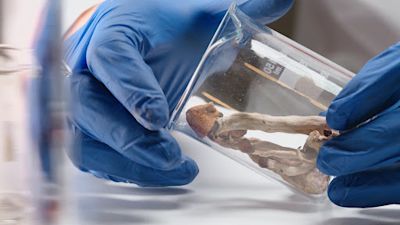Can magic mushrooms become a legitimate treatment for mental health illnesses?

Magic Mushrooms have been restricted as a Class A drug in the UK since 1971, but with new research into the use of the drug to treat mental health problems - could this change?
The ingredient under investigation is psilocybin, which is found in some species of mushrooms, often referred to as ‘magic mushrooms.’
Last year, Compass Pathways completed the world’s largest ever psilocybin study and Dr Guy Goodwin, their Chief Medical Officer, told S4C’s HANSH GRID their hope was to find a regulatory pathway to bring psilocybin medicines into use for patients over the next five years.
“Our initial focus is the use of psilocybin with psychological support for treatment resistant depression.”
Speaking at King’s College London, one of the sites where the trials took place, he explained why new treatments for mental health conditions are needed:
“Depression comes in all kinds of shapes and sizes, and mostly people are seen in primary care and they often get treated with SSRIs, the commonest antidepressants. Now they have modest benefits for lots of people but they are not particularly useful for many others. And it’s really the many others that we are concerned with, the people who don’t do well with these medicines and really need something better."
Drug advice service Frank warns that consuming magic mushrooms can cause paranoia, anxiousness, nausea and hallucinations.
Dr Guy Goodwin stressed that a key element of the psilocybin therapy they are developing is the support during the experience and after.
“Psilocybin is traditionally associated with magic mushrooms, but obviously we can’t really expect people to take mushrooms in a medical indication because we can’t really guarantee purity, we don’t really know what else is in them. So what we’ve gone for is the pure extract, which is synthesised independently and which is therefore a pharmaceutical product. That’s what our business is, to produce that, and to deliver it in a particular safe way, which means you have to prepare people for the experience that they’re about to have after they take it, you then have to support them whilst their having the ‘trip’ as it was traditionally called, which can be pretty weird."
“You’re never going to buy this to take it away and don’t use it at home would be my advice. It's a powerful experience and it can go wrong. We know from the 1960s when these drugs were more freely available, a lot of things went wrong and we want to avoid things going wrong in this new era.”
Results from Compass Pathways' first major study into treatment resistant depression found a “dramatic difference between 25 milligrams and a 1 milligram dosing.” The effect of the drug resulted in a big reduction in symptoms, and at 12 weeks 25% of patients who received a full dose were in remission.
In the first instance, the therapy will only be for treatment-resistant depression, however the company is eager to research other conditions.
“Depression is a key target but there are other conditions that are equally important, and we are interested particularly in PTSD which is Post Traumatic Stress Disorder and Anorexia Nervosa. "
Lara Rebecca, 21 from Cardiff was 11 years old when she first started experiencing anxiety, which led to panic attacks and depression. Shortly after, Lara developed an eating disorder and battled with anorexia nervosa and bulimia.
“The process of recovery was frustrating, and it was quite rigid.”
“I was on antidepressants and medicines for the mental health illness.”
“It would have been nice to have more options in terms of treatment because it was very medically focused rather than looking at the psychological aspects.”
“Although work is being done to focus on mental health, we’re still at the starting blocks, we still need to continue, we still need to work towards focusing on mental health and ensuring everyone is prioritising it.”
Despite not being sure if she would have chosen psilocybin treatment herself, after travelling to London to meet the research team she says she's opened her eyes to different treatments available.
“Before travelling to King's College London I was a bit sceptical to be honest, you’re using a class A drug, you’re using magic mushrooms to try to treat mental health. But after going there and learning… it’s really opened my eyes and shown me how much work is being done to develop new treatments.”
“Living with a mental health problem is so unique for everyone, so we need to consider that and understand it’s not black and white, it’s not a one size fits all [approach to treatment], so we do need to think more broadly.”
Catch up with Grid here. English subtitles are available.
Read more: